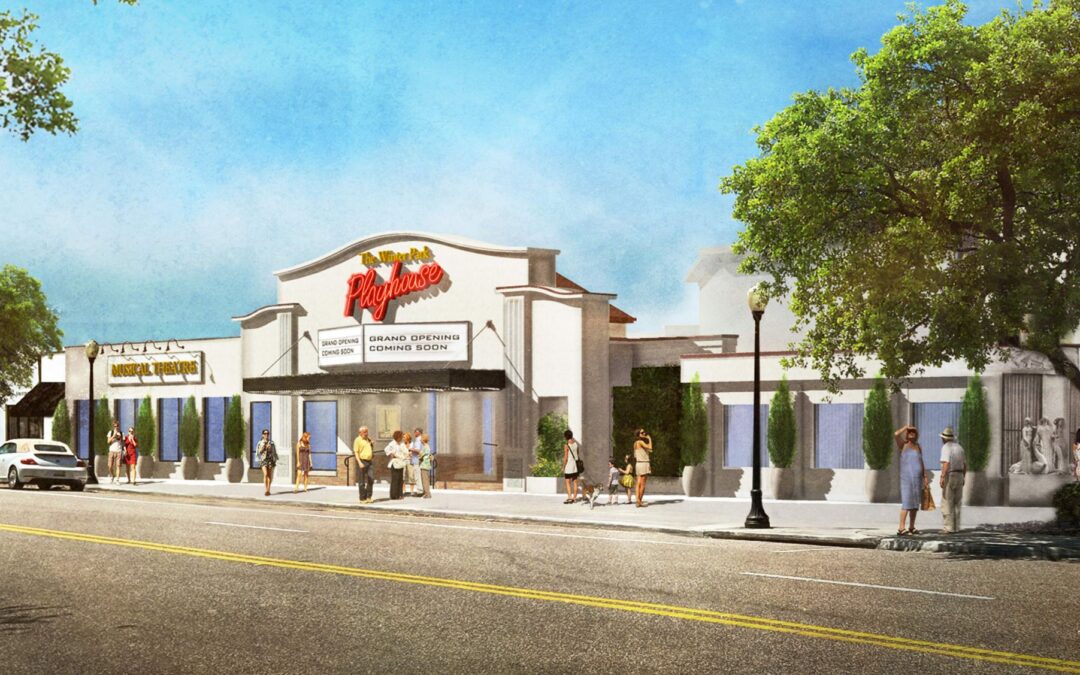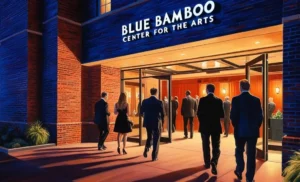Winter Park Playhouse, a commissioner's home and gas leaf blower ban top first agenda of 2025
Commissioners are slated to move forward on the purchase of the Playhouse building as Blue Bamboo seeks to move ahead with renovations at the old library. Changes to historic preservation rules as well as a designation of a commissioner’s home on the local register also up for consideration
Jan. 6, 2025
By Beth Kassab
Winter Park commissioners will return to the dais on Wednesday for the first time in the new year with an agenda that also highlights some of the issues that are likely to remain front and center through the first half of 2025.
Let’s dive right in:
The arts scene
After a long period of uncertainty about its future, the Winter Park Playhouse appears on a solid path to expanding in the same place patrons have come to love the community theater.
Commissioners will take a vote on the contract to purchase the building, part of a deal use Orange County tourist tax dollars for the acquisition and renovations that would allow the playhouse to stay put. The nonprofit theater was unable to purchase the building on its own and risked losing its stage if the land was bought and redeveloped by another owner.
The city considered multiple options, with some commissioners even angling to help the theater construct a new building in Seven Oaks Park, but ultimately settled on applying for a Tourist Development Tax grant. The county awarded the city $8 million in the fall to move forward on the project.
The city will purchase the building at 711 N. Orange Ave. for $3.8 million following a 60-day inspection period if the contract is approved. The remainder of the grant along with $2 million to be raised by the playhouse will go toward expanding seating capacity by 50% and other upgrades.
According to a staff memorandum posted with the City Commission agenda, the purchase would not impose any immediate costs to the city because it intends to enter a lease with the Playhouse that says the theater is financially responsible for all upkeep. But with the city as the owner of the land, it’s likely that the property will become exempt from taxes that fund city and county services such as roads, parks and schools — an estimated loss of about $15,000 each year to the city’s Community Redevelopment Agency.
At the same time, Blue Bamboo Center for the Arts is moving forward on its plans to renovate the old library, which it’s leasing from the city.
A rendering shows the proposed entrance for the new Blue Bamboo, which plans to repurpose the old library. (Courtesy of Blue Bamboo)
Executive Director Chris Cortez said the project is in the second round of permitting revisions and he hopes to start construction work soon. He is targeting opening the first floor of the building as a venue space during the first quarter of this year. Aside from adding stages and seating and making the bathrooms accessible to people who use wheelchairs, his team is looking at other changes such as converting the former book store into a space for records and retail similar to the Blue Bamboo’s old lobby.
“We love the original design,” Cortez said. “We aren’t proposing very many changes to the building structure at all.”
Historic Preservation
It’s unusual for city commissioners to bring business before their own board, but that will happen Wednesday when Todd Weaver asks fellow commissioners to add his home on Lake Bell to the city’s Register of Historic Places.
Weaver said he’s been contemplating historic designation for the mid-century modern home west of U.S. 17-92 for some time and decided to take action before longtime Planning Director Jeff Briggs retires this month.
Critics have asserted that Weaver has flouted city rules by adding on to the home without proper permits. But Weaver disputes those claims, noting that his neighborhood wasn’t annexed by the city until 2004 and the work he did was permitted by Orange County.
The home includes a 515-square-foot detached space that Weaver calls a “cottage.” He said it started out as a shed and was used as his shop for a time before he made changes to convert it into a living space.
Before he knew it was against city code, he rented out the cottage. But Weaver said he hasn’t done so since 2018 when he learned short-term rentals were not permitted by Winter Park.
He said he now offers the space for free to artists who are coming through town to perform with the opera or philharmonic.
A historic designation would allow Weaver to rent out the cottage for a minimum of 30 days at a time. Owners of historic homes are granted that perk to add value to properties that they have agreed not to demolish and rebuild at a larger footprint.
But Weaver says he doesn’t intend to take advantage of that provision.
“I don’t have any plans of renting it out now,” he said, but will allow the arts community to continue to use the space.
The Historic Preservation Board recommended last month that the home be added to the register.
“Many of these low-sloped roof, one-story homes from the 1950s are what the city routinely sees for tear-downs and rebuilds,” read the staff report. “Especially in lakefront locations. What this historic designation will do is to maintain the scale and look of the original homes built in this neighborhood.”
Commissioners will also consider new procedures and penalties when it comes to unauthorized construction or demolitions of historic properties. The changes are in response to recent violations in historic neighborhoods.
Under the proposed new rules, the ordinance would add a review process of construction plans after the initial approval. The code will also clarify that any authorized alterations or demolitions must be replaced by architectural styling from the era represented in the neighborhood, often from the 1920s to the 1940s.
In addition, if a structure is demolished without authorization, the city can revoke setback variances previously granted on the property in exchange for preservation. The new code also says property owners can propose financial compensation to the city as a way of retaining setback variances.
March elections
So far, the two City Commission seats up for grabs this year, have attracted just one candidate each. Without opposition, those candidates will be automatically elected and there will be no need for poll workers, ballot counting or any of the other related Election Day infrastructure.
As a result, commissioners will vote on Wednesday whether to convert the referendum on gas-powered leaf blowers to a mail-only ballot. The question before voters — if the city should keep and begin enforcing its ban on the lawn tools that generate frequent noise complaints — is the only other item on the March 11 ballot aside from the commission seats.
Commissioners gave initial approval in December to a mail ballot if no other candidates qualify to run for commissioner by the deadline at noon on Jan. 21.
So far Kris Cruzada, the incumbent, has filed to run again for Seat 3. Warren Lindsey, a criminal defense attorney, filed to run for Seat 4 after incumbent Todd Weaver opted not to run again.
The board is required to vote on the change a second time and will also consider revised wording intended to clarify the ballot question.
Up for discussion
Commissioners are also set to approve their own meeting schedule for the first quarter, including a series of discussion-only workshops through March. The topics of those meetings help illustrate the board’s upcoming priorities:
Jan. 23: The concepts for a Park Avenue refresh project
Feb. 13: A debate about the process and criteria, if any, the city should consider when awarding grants to local nonprofits
Feb. 27: Changes to the city’s election code
March 13: The group’s first discussion about the 2026 budget
March 27: The city’s street sweeping policy
WinterParkVoiceEditor@gmail.com



The WP Playhouse “lease” is another sweetheart deal. Taxpayers are paying for the building, renovations and the annual rent is going to be……$1 a year. Ridiculous!
Todd Weaver does not need a historic destination to allow musicians to stay in his shed, as he says he is currently doing. And if he has the permits, let’s see them. OC has no record of one permit allowing living quarters. https://fasttrack.ocfl.net/onlineservices/permit-building.aspx?SearchID=RES
WP Playhouse should pay market rent, otherwise it is sweetheart deal as previously mentioned that only serves very few actual residents of Winter Park. There needs to be a return on investment for the property that actually benefits all residents of Winter Park.
What is historical about Weaver’s home and did he pull the correct permits? Hopefully these items will be fully addressed during the meeting.
The Winter Park Playhouse and The City of Winter Park received a TDT grant from Orange County for 8 million dollars. No taxpayer money is being used for the purchase or the renovations of this theatre.
This is a tourism grant. No taxpayer dollars used! And, the City will purchase and will renovate a building with this grant funding. The Playhouse will pay the upkeep for long term while still contributing their 1.9 million dollar economic impact to the community and serving underserved Title I schools and the Winter Park elderly shut in seniors all for free.
This is a win for our community.
To be clear, TDT dollars are county tax dollars. This is generated from the money collected via the bed tax at hotels. Historically, the tourism industry has spent and/or controlled nearly all of these dollars. These grants are a way of targeting needs in the community that help build and sustain arts and community groups, though these projects are also judged by the evaluation board on ability to draw visitors etc. in addition to financial readiness and other factors. The grant does NOT include city tax dollars that could otherwise be spent on police, parks, infrastructure, city services etc. Hope this helps!
Where are those snobby WP folks storming the Tourist Development Council saying ” We are Winter Park, we don’t need your dollars! ” Remember those days when TDT dollars were given to help build the new Library.